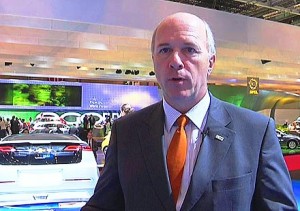Carl-Peter Forster has resigned as chief executive officer and managing director of Tata Motors, citing a serious illness in his immediate family. He will remain a non-executive director of Tata, the ambitious Indian automaker that purchased Jaguar and Land Rover from Ford Motor Co. two years ago.
Forster had joined Tata in February, 2010 after a long career with General Motors that ended in 2009 when he supported the sale of majority control of GM’s Opel subsidiary to a consortium of Russian Banks allied with Canadian automotive supplier Magna International Inc. The deal was scrubbed after a series of executive changes at GM,notably including the ouster of CEO Fritz Henderson who, like Forster, had supported the sale.
“The board respects Carl-Peter’s personal circumstances that led to this move,” Tata Chairman Ratan Tata said following Forster’s resignation. “We would like to thank him for his contributions to the successful development of our company.”
Tata is the largest of the domestic Indian automakers and arguably the most ambitious. The Tata brand name is perhaps best known for its Nano model, the world’s cheapest automobile. But Tata has struggled to expand out of its home market and has been counting on its two British brands to help it become a truly global player in the competitive automotive industry. But things are clearly not going as well as Tata hoped.
As a result, the loss of Forster is generating some strong reactions.
“We view the sudden resignation of Carl-Peter Forster, CEO of Tata Motors as a loss for the company, but not an insurmountable one,” said Standard & Poors automotive analyst Efraim Levy. “While Mr. Forster played an important role in the recovery of the acquired Jaguar-Land Rover, we believe there is sufficient retained management depth.”
In the wake of the German executive’s departure, Prakash Teland, who has served as manager of Indian operations, and Ralf Speth, head of Jaguar-Land Rover, will represent their operations on the Tata board.
Other analysts were less upbeat, one suggesting a “pillar” of the company had been lost. The resignation immediately resulted in a more than 9% plunge in Tata Motors’ American Depository Receipts, or ADRs. Shares dipped by 3.3% in India.
Tata has suffered an 18% decline in Mumbai trading this year, in large part due to its problems in India. After an initially strong start, the little Nano has seen a sharp drop in sales – the numbers off 85% in August. Overall, Tata’s passenger car sales dropped by a third last month. The maker’s Jaguar operations have been struggling, especially in the key North American market, though Land Rover has gained share and is expected to continue building with the current launch of the new Range Rover Evoque model.
“We are positive on long term growth in vehicle demand growth in India, but do see near term challenges from higher interest rates hurting demand and from increased raw materials costs that are pressuring margins,” cautioned S&P’s Levy.
While Speth and Teland are expected to temporarily cover for the now-departed Forster, Indian observers say they expect a formal replacement within the next two to three months.

